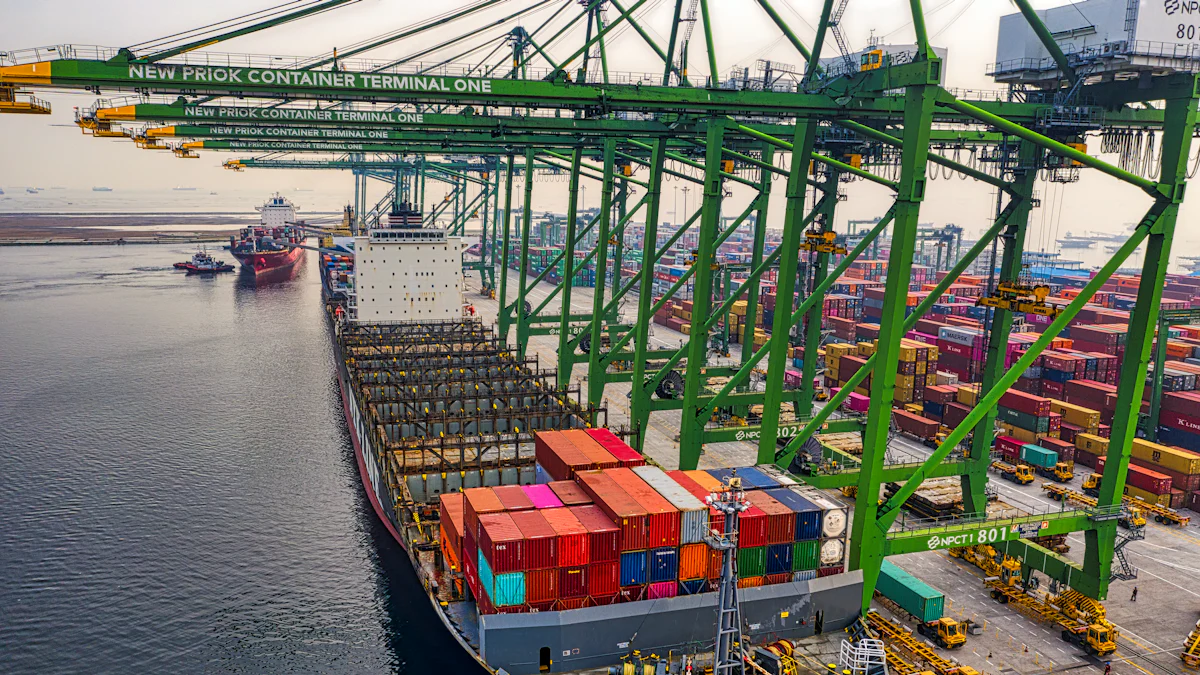The Impact of Geopolitics on Logistics and Supply Chains

Geopolitics, logistics, and supply chains form a complex web that influences the global economy. Geopolitical dynamics shape trade routes and affect the availability of resources. Logistics ensures the smooth movement of goods across borders. Supply chains connect production to consumption. Understanding their interconnection is crucial for businesses navigating today's volatile environment. The Impact of Geopolitics on these systems is profound. Recent trends show a shift in trade patterns, with countries like China and the United States adjusting their strategies. The IPEF Supply Chain Agreement aims to stabilize these changes. The IPEF Supply Chain Council addresses challenges like the IPEF Supply Chain Crisis. American Innovation plays a pivotal role in adapting to these shifts.
Impact of Geopolitics on Supply Chains

Geopolitical Instability
Geopolitical instability poses significant challenges to supply chains. Political instability threatens supply routes, affecting the movement of goods across borders. The South China Sea, a critical maritime route, often faces geopolitical tensions. These tensions can disrupt trade and lead to rerouting, causing delays.
Transportation costs rise when geopolitical risks affect trade routes. Companies need to find alternative paths, which can be longer and more expensive. The Federal Reserve published reports indicating that geopolitical instability can increase inflationary pressures. Businesses must adapt quickly to avoid financial losses.
Geopolitical Risks and Economic Sanctions
Geopolitical risks often lead to economic sanctions, impacting global trade. Sanctions can disrupt supply chains by restricting access to essential goods. For example, sanctions on Chinese technology firms have affected global semiconductor supplies. Companies relying on China-originating supply chains must find new suppliers to mitigate these disruptions.
Case Studies:
Russian Real Estate Freezes: Sanctions led to seizures of assets, affecting industries dependent on Russian resources.
Ukraine Conflict: Political instability in Ukraine disrupted European supply chains, highlighting the need for diversification.
Understanding geopolitical risks is crucial for businesses. Companies must develop robust risk mitigation strategies to protect their operations. Diversification of suppliers and logistics routes can help manage these risks effectively.
Trade Agreements and Geopolitical Consensus
Trade agreements play a vital role in facilitating international trade. Geopolitical consensus among nations can lead to smoother trade relations. The Global Innovation Strategy emphasizes the importance of collaboration in trade. Countries like China and Europe work towards agreements that benefit all parties involved.
However, challenges arise in negotiation and compliance. Different political agendas can delay agreements. The Chinese Communist Party's policies often influence trade negotiations. Businesses must stay informed about these changes to remain compliant.
Logistics Challenges in a Geopolitical Context

Infrastructure and Border Controls
Infrastructure plays a crucial role in logistics. Geopolitical tensions often lead to delays and bottlenecks at borders. Governments impose stricter controls, which slow down the movement of goods. Companies face increased costs due to these delays. The danger of extreme disruption becomes evident when supply chains rely heavily on specific routes. Businesses must adapt quickly to avoid significant losses.
Security concerns also arise from geopolitical instability. Countries enhance border security to protect against potential threats. This creates additional challenges for logistics operations. Companies must comply with new regulations and ensure their goods meet security standards. Failure to do so can result in severe disruptions. The danger of extreme disruption looms large for businesses unprepared for these changes.
Technological Advancements and Rewiring
Technology offers solutions to overcome logistical challenges. Companies use Data Center Cooling Technologies to manage risks effectively. Real-time data helps monitor geopolitical events and adjust strategies accordingly. Businesses gain insights into potential threats and take proactive measures. This approach reduces the danger of extreme disruption in supply chains.
Innovative solutions emerge from technological advancements. Data Center Owners invest in new technologies to enhance efficiency. These innovations streamline operations and improve resilience. Companies adopt Data Center Predictions to anticipate future challenges. This forward-thinking approach ensures continuity in supply chains. The data center industry benefits from these advancements, leading to improved performance.
Data Center Staffing plays a vital role in managing logistics. Skilled professionals handle complex tasks and ensure smooth operations. Companies invest in training programs to equip staff with necessary skills. This investment pays off as businesses navigate geopolitical challenges. The data center becomes a hub of innovation and efficiency.
Data Center Cooling remains essential for optimal performance. Efficient cooling systems prevent overheating and maintain equipment integrity. Companies prioritize cooling solutions to ensure reliability. This focus on cooling enhances the overall efficiency of the data center. Businesses achieve better results by investing in advanced cooling technologies.
The center of logistics operations lies in adaptability. Companies must remain flexible to respond to geopolitical changes. A proactive approach minimizes risks and ensures continuity. Businesses that embrace change thrive in a volatile environment. The data center serves as a critical component in this adaptive strategy.
Strategies for Mitigating Geopolitical Risks
Diversification of Supply Chains
Benefits of multiple sourcing
Companies often face disruptions due to geopolitical tensions. Multiple sourcing offers a solution by spreading risk across various suppliers. Businesses can maintain operations even if one supplier faces issues. This approach increases flexibility and reduces dependency on a single source.
Multiple sourcing enhances competitive advantage. Companies can negotiate better terms with suppliers. This strategy also improves supply chain resilience. Businesses can quickly adapt to changes in the market. Customers benefit from consistent product availability.
Case studies of successful diversification
Case Study: How Should We Diversify Our Supply Chain?
A leading electronics company faced supply chain disruptions. The company decided to diversify its suppliers. This strategy reduced vulnerabilities and improved agility. The company gained a competitive edge over its rivals. Customers experienced fewer delays in product delivery.
DHL Trend Report on Supply Chain Diversification
DHL implemented a proactive diversification strategy. The company focused on enhancing customer centricity and sustainability. DHL's approach increased resilience and agility. The company maintained operations during geopolitical disruptions. Customers appreciated the consistent service quality.
Building Resilience and Understanding Geopolitical Risks
Importance of flexibility and adaptability
Flexibility is crucial in managing geopolitical risks. Companies need to adapt quickly to changing environments. Businesses that remain rigid face greater challenges. Adaptability allows companies to seize new opportunities. This approach ensures long-term success in volatile markets.
Resilience involves preparing for unexpected events. Companies must develop contingency plans. These plans help businesses respond effectively to disruptions. A resilient supply chain minimizes financial losses. Companies can maintain customer trust and loyalty.
Strategies for risk management
Effective risk management requires a comprehensive approach. Companies should conduct regular risk assessments. These assessments identify potential threats to supply chains. Businesses can then implement strategies to mitigate these risks.
Diversification plays a key role in risk management. Companies should explore new markets and suppliers. This approach reduces dependency on specific regions. Businesses can better navigate geopolitical challenges.
Investing in technology enhances risk management. Real-time data provides insights into potential threats. Companies can make informed decisions quickly. Technology also streamlines operations and improves efficiency. Businesses gain a competitive advantage through innovation.
The Impact of Geopolitics on logistics and supply chains remains profound. Companies worldwide must adopt proactive strategies to navigate these challenges. The Uptime Institute emphasizes the importance of Renewing American Innovation in this context. Diversification of supply chains, such as the American semiconductor supply chain, enhances resilience. The Uptime Institute Intelligence highlights the need for strategic planning. The Renewing American Innovation Project focuses on strengthening the Semiconductor supply. The Future outlook suggests a continued focus on innovation and adaptability. The Uptime Institute Journal underscores the role of technology in mitigating risks. CSIS Renewing American initiatives support this approach.
See Also
Unraveling the Influence: Trends in Logistics Risk
Transforming Transportation: Supply Chain Innovation's Influence
The Importance of Security in Supply Chain Logistics
